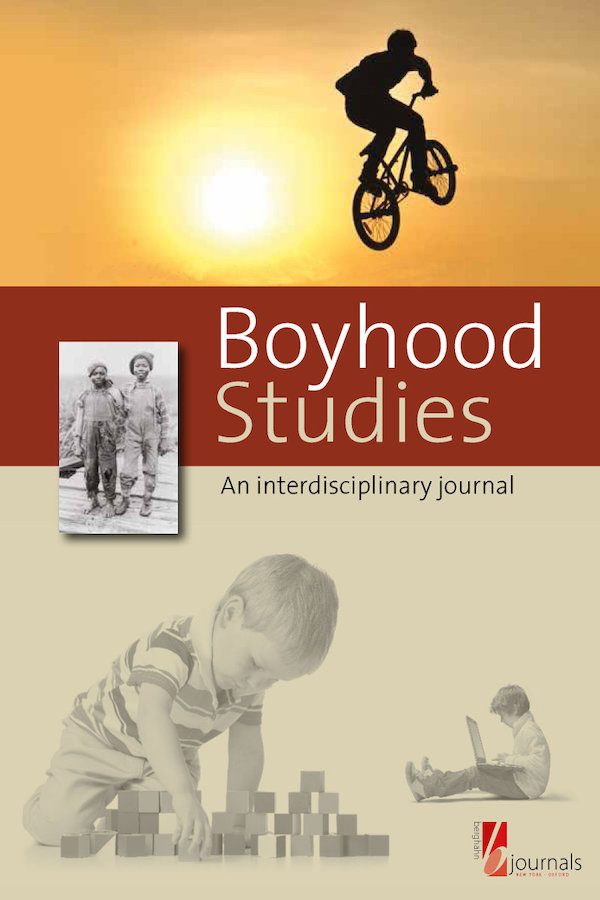
Boyhood Studies
An Interdisciplinary Journal
ISSN: 2375-9240 (print) • ISSN: 2375-9267 (online) • 2 issues per year
Interim Editors:
Jonathan A. Allan, Brandon University
Chris Haywood, Newcastle University
Subjects: Gender Studies, Childhood and Youth Studies, Education, Social Sciences, Cultural Studies
Latest Issue
Volume 18 Issue 1
Editorial
Boyhoods are everywhere. Everyone seems to be concerned about them. News stories proliferate about boys and young men daily. Not only, then, are men in crisis, but so too are the boys who are on the cusp of becoming men. Time and again we hear these stories. Perhaps now more than ever, the study of boyhood is necessary, urgent, and vital.
Will Boys Be Boys? Be KINDER
Deconstructing Stereotypes from Childhood, the Case of Portugal
This article examines the early development of social gender norms in children, emphasizing how family and school environments influence their attitudes and gender expectations. It centers on the KINDER project, active from 2021 to 2023, which aimed to address gender stereotypes in early childhood and elementary education. Drawing on theories by Althusser and Freire, it suggests transformative educational practices to challenge existing norms. Utilizing methods such as focused interviews and quantitative research, the project devises an inclusive approach with educational resources and campaigns promoting empathy, nurturing masculinities, and diversity in curricula. The article underscores the ongoing necessity for initiatives to cultivate more equitable and inclusive educational environments.
How Hegemonic, How Non-Hegemonic?
An Analysis of Masculinity in Indian Children's Literature in English and Gujarati Languages
In the wake of feminist reshaping and postcolonial interrogation of the adventure genre, this article investigates men/boys in the Indian adventure narratives for children to decode what society wishes to be, what it wishes to be seen as, and what it unconsciously reveals itself to be in the areas of masculinity and manliness. Content analysis of the Indian children's adventure stories in English (ICLE) and Gujarati languages (CLG) is undertaken by grounding the framework of hegemonic masculinity in the Indian context. The conclusions reveal myriad strategies employed by hegemonically gendered texts to adhere to the wide spectrum of hegemonic masculinity and by non-hegemonically gendered ones to interrogate, invert, ridicule, and replace these ideals. These conclusions underline the importance of examining masculinity as a location of gender politics.
Brave, Bare, and Unabashed—Why Bare-bones Narration is Disconcerting, yet Humanizing
Finding Answers in Autobiographical Narratives
Sex is a social behavior that requires learning, but its discussion is often shrouded in mystery. Family and friends may provide inconsistent or misleading information about the body and sex. Misconceptions surround pubertal changes and sexual awakenings. Teenagers face challenges in understanding sexual orientations and activities due to restrictive societal norms. Literature may offer a safe space for such explorations. Indian boyhood fiction often sidesteps these issues, but memoirs like those of Krishnagopal Mallick, Bhisham Sahani, and Khushwant Singh candidly address pubescence. This article examines how autobiographical narratives help adolescents navigate emotional turmoil during pubertal changes and emerging sexuality. Relevant excerpts provide insights into emotional complexities beyond biological explanations. These stories offer a relatable and convincing understanding of growing up, aiding teenagers in their journey of self-discovery.
Language Repertoire as Radical Queer Love
A Boy's Journey
The present essay is dedicated to the relationship between extreme multilingualism (or a polyglottal language repertoire) and queerness. The author employs an autoethnographic method and revisits a three-month period when he was fifteen years old, focusing on four languages (i.e., French, Arabic, German, and Polish) and a journey that took him across Europe from Western Poland to Paris and back. This reflexive narrative is evaluated through the lens of language biographies/trajectories in the era of superdiversity and mobility, leading to the following conclusion: The author's language acquisition and multilingualism have been reflective of and motivated by his queerness. That is, the author has not acquired his extreme multilingual repertoire and has not learned over forty languages because of education, work, or skills-related needs and aspirations, but because of the love he has felt and made to real and imaginary people. The key element in shaping this queerness-driven polyglotism has been the author's mobility—language being understood as a biographical trajectory that runs across (informal) spaces, emotions, minds, and bodies. The author interprets the above observations within a radical pedagogical approach to education and contends that, to learn languages, we need sensitive lovers rather than (more) teachers and classrooms.
Growing Up Gay
Reconciling Queerness and Boyhood in Douglas Stuart's Young Mungo , a Queer Bildungsroman
Few literary genres better capture the complexities of boyhood than the bildungsroman, which traces a young protagonist's development alongside his attempts at societal integration. In the genre's queer iteration, particularly the gay male bildungsroman, boyhood becomes further complicated by the tension between masculinity and queerness. This article examines how Douglas Stuart's
The Privilege of “Not Having to Be Affected”
Constructions of Autonomy among Male Adolescents through Sexting
The following article analyzes constructions of masculinity through sexting practices among adolescents in Germany. Drawing on theories of masculinity and data from group discussions with adolescents, the research identifies gendered differences in experiences of sexual boundary violations via digital media. Male participants in our study use distancing strategies and do not perceive themselves as affected by such violations, while female participants identify themselves as potential victims. This phenomenon is interpreted as the masculine privilege of “not having to be affected.” The article argues that autonomy emerges as a key paradigm in contemporary constructions of masculinity. These findings contribute to understanding how gender inequalities are reinforced through digital sexual communication and highlight the role of perceived autonomy in maintaining hegemonic masculinity.